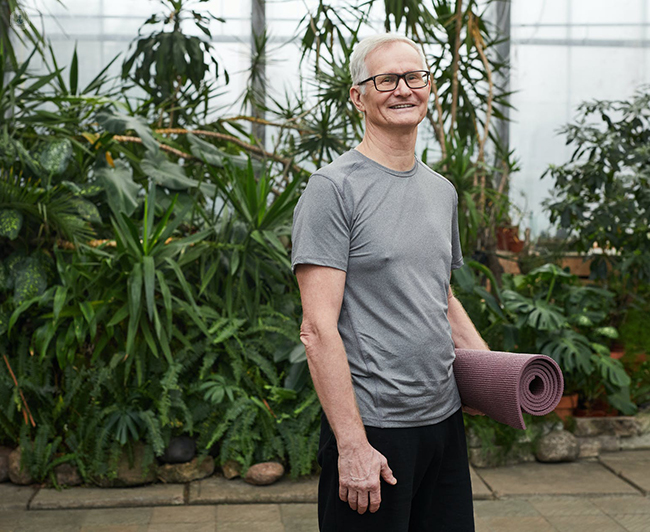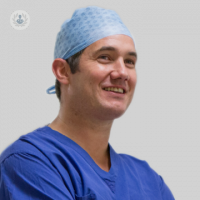Do I need a knee replacement?
Written by:Undergoing knee replacement surgery can be a life-changing experience for those who have spent years living with persistent knee pain, which is commonly related to osteoarthritis. But how do you know if the procedure is necessary in your case? We spoke to one of our expert orthopaedic surgeons, Mr William Jackson about the different treatment options available for knee pain and the signs that knee replacement might be right for you.

What are the first signs you may need a knee replacement?
Knee replacements are a very effective treatment for end-stage arthritis. Often patients have experienced early arthritic symptoms for years and recognise that slowly their knee symptoms are becoming more problematic and other treatments are less effective.
Knee replacements should be considered when knee symptoms are affecting your quality of life. For some patients, that is when they get night pain that regularly affects their sleep. For others, that may be when they can no longer play a round of golf and game of tennis at the weekend. The decision is really a personal choice that is made in consultation with your surgeon.
What conservative treatments can you try before undergoing surgery?
There is a spectrum of treatments that can be effective for osteoarthritis. There is lots of evidence that a program of low impact cardiovascular exercise, including knee strengthening and flexibility, can be really effective. Simple pain killers can help to manage pain and allow you to get back to a low impact exercise program.
We know that carrying extra weight can make symptoms worse and it is also is associated with quicker progression of arthritis. Unfortunately, being overweight also increases the risk of many other interventions and so a vital part of managing arthritis should include optimising this.
If people experience flares of arthritis with pain and swelling, steroid injections can be very effective. They are relatively simple to perform with low risk and can produce substantial improvements in symptoms.
There are some newer injections becoming available for managing arthritis, which includes visco-supplementation where some additional lubrication can be injected into the knee. Injections are newly available which can also target pathways that produce pain in osteoarthritis, but have some good early data showing they can help with knee symptoms.
Should I wait until I am older to have a knee replacement?
We tend to perform knee replacements more commonly as people get older. This is because end-stage arthritis presents later in life. Some patients may experience arthritis earlier in life secondary to injuries and this can be more challenging to manage.
There is no cut off age for when knee replacements aren’t considered but the risks from knee replacement surgery, particularly where the replacement will need to be revised over time, can be considerably higher. This must be factored into the decision making process. We have published some data from the UK showing if you have a knee replacement in your mid-60’s, it is most likely that this would last for your lifetime.
What are the different types of knee replacements?
The National Institute for Health and Care Excellence (NICE) have recently published data that encourage surgeons to offer patients partial knee replacements when appropriate. There is good evidence that suggests this is appropriate for 50% of patients requiring knee replacement surgery and avoids unnecessarily resurfacing areas of the joint that are normal.
Currently, only 10% of knee replacements in the UK are partial knee replacements. These knees are less invasive and have lower risks associated with them. Patients recover much quicker after surgery and many can even be performed as a day case procedure.
The functional results are better than with conventional knee replacements. If these are performed by surgeons with an interest and expertise in partial knee replacements then the risks of having problems and needing revision surgery are similar to total knee replacements.
For some patients, the arthritis is more advanced and a partial knee replacement is not appropriate. Total knee replacements resurface the whole joint surface and again are a very effective treatment. There is an increasing interest in a more personalised approach to how these are implanted and I have been involved in helping to develop these techniques.
There is good emerging evidence to say that this technique (kinematic alignment) produces better outcomes after total knee replacement surgery.
Will I be able to resume normal activities/sports following a knee replacement?
After a period of recovery and rehabilitation, most patients will see a huge improvement in their symptoms and activity. How much people can do after knee replacement surgery is quite dependent on what they were doing before the surgery. For patients who have not been able to walk for 3/12, being able to get to the shops is a massive improvement and can dramatically improve their quality of life.
With partial knee replacements, we really place no restrictions on patients activities and many get back to a high level of sports and activities. For total knee replacements, we are more cautious about encouraging patients back to higher impact activities. Total knee replacements are good for walking, bowls, doubles tennis, golf and recreational piste skiing.
If you would like Mr Jackson’s expert medical opinion in your case, you can book an appointment with him via his Top Doctor’s profile here.


